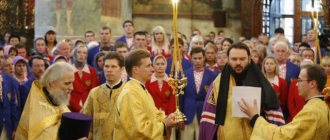How and by whom the penitential canon was created
The penitential discipline of Christians has been formed since ancient times. At the same time, corresponding prayers arose. Initially, they were performed during worship in the temple, and not privately. The canons in their current form are believed to have appeared around the 8th-9th centuries. Their authors were monks - St. Andrey Kritsky, Rev. John of Damascus, St. Cosma Maiyumsky and others. In Rus', the practice of reading canons spread only from the 14th century. Since that time, special liturgical books have been known - Canons.
Neither the time of creation nor the authorship of the canon of repentance to Jesus Christ is known exactly. Some attribute it to the famous commander and pious Christian, A.V. Suvorov. He allegedly created this text inspired by the Great Penitential Canon of St. Andrew of Crete, which is read in churches during Lent.
Such a text by Suvorov actually exists, but it differs quite seriously from the Canon to Jesus Christ found in the prayer books.
In any case, there is no doubt about the antiquity of the penitential text, its impact on the soul, which many believers experienced.
What is a prayer of repentance, and what is true repentance?
1 A prayer offered to God by a person who has realized his need for a Savior and forgiveness of sins is called a prayer of repentance . The prelude to this is a person’s faith in the atoning sacrifice of the Son of God, Jesus Christ; in the fact that He really, being Holy and Righteous, suffered for us: He was mocked and tortured, sentenced to crucifixion, crucified on the cross of Calvary 2000 years ago, died, was buried and on the third day was miraculously resurrected, appearing to many disciples; on the fortieth day after His resurrection, in the eyes of many witnesses, He ascended on a cloud and returned to God the Father. He presented to the Father His precious blood, shed for the sins of every person as evidence of the sacrifice of atonement for us all, thereby fulfilling the condition of justice - for the wages of sin is death, as written in the Scriptures. God the Father was satisfied with the sacrifice of the Son, and God now views every person as completely cleansed and free from sin, washed by the Most Holy Blood of His Son, Jesus Christ. We, all people on earth, have been redeemed from slavery to sin through the sacrifice of Jesus. This is the gift of love and mercy shown by God to humanity.
So what is repentance in our modern understanding? This is a person’s appeal to God through prayer with a request to grant forgiveness of all his previous sins. If before this person was satisfied with his previous life in sins: fornication, lasciviousness, envy, love of money, anger, theft, non-forgiveness (the list goes on), and he liked to do many things from this, then after truly turning his face to God, the person will no longer be able to live as before. The whole world will change in his eyes. Previous values will lose all meaning for him. He will begin to hate every sin and strive with all his might to prevent it from happening in his life. All the values of God the Father will become his values, because God Himself, through the Holy Spirit, will live in man.
19 Do you not know that your body is a temple of the Holy Spirit who dwells in you, which you have from God, and you are not your own? 20 For you were bought with a price. Therefore glorify God both in your bodies and in your souls, which are God's. (1 Cor. 6:19,20)
16 Do you not know that you are the temple of God, and the Spirit of God dwells in you? (1 Cor. 3:16)
2 What is true repentance? - this is a voluntary act of a person who has made a final, irrevocable decision to turn away from the previous fruitless deeds of the darkness of this age and live for God. His decision is determined by a deep awareness of his sinfulness and does not depend on his feelings and emotions. No one, not even God, can force him to repent. A person makes his own choice according to his free will. God, in His mercy, only leads a person to repentance through hearing the truth of the word of God - for oh, “faith comes by hearing, and hearing by the word of God,” but the choice “to repent or not to repent” is up to the person.
Also , true repentance is like turning a person’s entire life 180 degrees. For example, the life of the great prophet and leader of Israel Moses. The adopted son of the pharaoh's daughter, raised at the court of the ruler of Egypt, he could, along the line of his life, enjoy temporary sinful pleasures, basking in luxury and abundance. But an encounter with God, present in a fireproof bush, changed his life 180 degrees. Having believed God and fulfilled His instructions, Moses became a hero of faith, leading the people of Israel out of Egyptian slavery. His ministry on earth was accompanied by great wonders and signs. God gave through him the ten cardinal commandments and the law for Israel.
3 The form of turning to God at the moment of repentance is arbitrary, in your own words, from the bottom of your heart. The main thing is recognition (confession) before the Heavenly Father of your sinfulness and a sincere, from the bottom of your heart, desire to change. When praying for the forgiveness of sins, you must acknowledge Jesus Christ as your Lord and Savior. It is good if a person publicly turns to God at the moment of confession, thereby testifying to God and people his final decision. This can be done by calling a preacher or evangelist to confession in places where the gospel is preached, or in a local church that practices this method. At one time, I myself went to the altar to repent publicly. Yes, this requires a certain courage and courage, but it does not give a person a chance to look back. After all, our faith must be tested by works. Anyone reading this article can view the approximate content of the prayer at the time of repentance on my “Prayer Room” page.
Be sure to watch the video!
If you liked this article, please share it with your friends on social networks - click the buttons below. And don’t forget to subscribe to site updates to receive new articles by email
All the best. Sincerely, Vyacheslav Erogov
Source: https://chydesa777.ru/chto-takoe-molitva-pokayaniya/
When to read
Orthodox prayer books contain the penitential canon for Christ both as part of the Rule for Holy Communion and separately. It is usually read:
- in preparation for confession, in order to properly prepare the soul for repentance;
- in preparation for the sacrament of Communion (Eucharist), in order to once again realize one’s unworthiness, to help oneself reverently approach the shrine;
- in any other case, when the soul is burdened by despondency, consciousness of sins, support from above is required.
In preparation for confession
When preparing for the Sacrament of Repentance, many find it difficult to see their spiritual state. Others, on the contrary, seeing their fall, despair, worry, grieve excessively for their sins, and stop hoping for God’s help. Time-tested church prayers, compiled by saints who have extensive spiritual experience and know how to correctly lead a person to repentance without plunging him into despair, help to find the right balance. One of these texts is the Canon of Jesus Christ.
Songs 1-3 of the canon are not so much a prayer to the Lord as a call to the believer for his soul to repent, to turn to God from worldly addictions. Here we remember possible human sins that remove us from the Lord. The believer is reminded of the Last Judgment, at which not so much God's Judgment will take place, but rather the judgment of the conscience of man himself over his soul.
But the sight of your constant falls should not plunge you into despair. Songs 4-8 remind the repentant of the goodness of the Creator and His love for people, of the wise structure of the world. The soul is called upon to renounce its sins and iniquities, think about eternity, and turn to its Creator - the only real meaning of human existence.
Finally, Canto 9 is the fervent request of a repentant person to the Mother of God, the Angels, and all the saints to beg God for help to correct a person’s life, because without this real changes are impossible. The culmination of repentance is the final prayer of repentance to Christ.
Canon and Communion
In preparation for the sacrament of the Eucharist, it is customary to read the penitential canon as part of the so-called Three-Canon, consisting of canons that can be read either one after the other, or combined:
- Christ;
- Mother of God;
- guardian angel
When reading the Three Canon together, the prayers are read as one canon. After the Three Canons comes the Rule for Holy Communion, placed in the prayer books.
In every sorrow
The Penitential Canon can also be read outside of preparation for the sacraments, under any difficult circumstances requiring the help of the Lord. It can be:
- illness;
- everyday troubles;
- difficulties of family and personal life.
The help that a believer receives when turning to Christ is, of course, not connected with the text being read as such. Repentance and humility, which the words of the ancient text encourage, change a person, his attitude towards God, his life. Heartfelt repentance calls upon the believer to receive God’s help.
From modern church life, there are known cases of even the healing of illnesses that accompanied the reading of this prayer book.
One of the priests says that a seriously ill woman came to him, practically dying of cancer. The priest blessed her to read the canon of repentance to Christ with contrition for her sins, and to confess more often. A few months later, this parishioner herself came to thank the priest: with God’s help, she not only changed her life, but was also healed of a fatal illness.
Prayer to the Lord
The strongest prayer is considered to be one of repentance directed to the Lord himself. Such words can:
- support in the most difficult moments;
- cleanse yourself from sins;
- free yourself from devilish temptations;
- receive God's help and blessing.
Photo source: shutterstock.com
Text of the prayer for repentance:
“Oh merciful Father! Our Father! To You I offer a prayer for forgiveness for my sinful actions! I beg You, allow me to repent of my mistakes and unrighteous actions. Give me Your forgiveness, allow me to cleanse my soul from sins and fill my heart only with love for You and sincere faith. I pray, forgive me, Your servant, for I repent. May I praise You to the heavens, my Lord. In the name of heaven and all saints. Amen".
The main thing is that the words of prayer come from the heart. If you do this with a pure soul, you will be able to free your conscience from sin and strengthen your faith. It is also very important to thank the saints for their help and never repeat your mistakes!
__________
How to read correctly
The word "canon" is translated from Greek as "rule". This means a clear structure of this prayer book and certain rules for reading it.
Structure
The canon consists of 9 songs. Each song is preceded by an irmos, which talks about the events of the Holy History of the Old Testament related to the content of each song. Then follow the troparia - short prayers, in this case - penitential ones. Before the troparion there is a chorus, or refrain. It is short but expressive: “Have mercy on me, O God, have mercy on me.” The last troparion is dedicated to the Mother of God. It is preceded by a glorification of the Holy Trinity. There is no need for a chorus before it, but the words are pronounced: “Glory to the Father, and the Son, and the Holy Spirit, now and ever and unto ages of ages, amen.” In prayer books they are usually given in abbreviation: “Glory even now.”
It should be noted that the 3rd canto follows the first, that is, the 2nd canto is omitted. This is a feature of almost all canons. According to established tradition, 2 cantos recall the Lord’s suffering on the cross. Therefore, this song is absent from the canons read outside of Lent. It is found only in the Lenten Great Penitential Canon of St. Andrey Kritsky. Thus, the canon of Christ actually consists of 8 songs. In addition, it contains:
- Sedal after 3 songs;
- kontakion and ikos after the 6th song;
- final prayer to Christ.
Irmos, troparion, kontakion, sedalen
Modern people do not always understand the Greek names of the components of the canon, which require explanation. Irmos is the opening stanza of each of the 8 songs. Irmoses are taken from the biblical texts of the Old and New Testaments, reminiscent of the events of that time:
- 1 song - about the passage of the Jews through the Red Sea, “like dry land” (Ex. 15: 1-19);
- 3 songs – about the birth of the prophet Samuel (1 Samuel 2: 1-10)
- 4 songs - words of the prophet. Habakkuk about the future Birth of Christ (Hab. 3-19);
- 5 songs – the song of the prophet Isaiah (Is. 26: 9-19);
- 6 songs - the words of the prophet Jonah, who was swallowed by a whale for opposing the will of God and freed after repentance (Jonah 2:3-10);
- Songs 7 and 8 recall the miracle of three Jewish youths thrown into a burning furnace by the king of Babylon for confessing God, but saved by an Angel (Dan. 3: 26-88)
- Song 9 is taken from the Gospel (Luke 1: 46-79), dedicated to the Mother of God.
If you want to pray meaningfully, immersing yourself deeply in the content, before reading, you can briefly become acquainted with the biblical fragments mentioned in the irmos. Troparion is a short prayer chant that describes the essence of the holiday, containing an appeal to a saint or a prayer. In this case, the troparia are penitential.
Kontakion is also a short prayer. Previously, kontakia were large chants, the text of which was wound on a special stick, which was called a kontakion. Gradually the kontakion was reduced to a short prayer.
Sedalen is a chant during which believers could sit down. When the canons were sung during a church service, the sedals were preceded by long prayers and psalms, which were sung while standing. Then they could sit down for spiritual reflection on what they had heard.
Language
The text of the canon of repentance can usually be found in Church Slavonic, but in modern civil script. There are also translations of the canon into modern Russian. This helps to understand certain words that are no longer used, however, according to many believers, translation into a modern language is not without distortion of the meaning. Therefore, most believers prefer to read the penitential canon in Church Slavonic.
General reading rules
Pious tradition requires reading repentant prayers while standing. This is a feasible tribute to the all-holy God, and at the same time penitential work. Of course, if you cannot stand, you can read while sitting. You can also sit down while reading the sedalna, so named for this very reason. As with any other prayer, you should turn your face to the icon of Christ. It is believed that it is best to read out loud. This helps the believer to concentrate and drive away extraneous thoughts.
When reading during the service, irmos and, sometimes, choruses are sung in chorus, and troparia are read. The main voice is the 6th voice, sad, inciting contrition for sins. When reading at home, singing, of course, is not necessary; you can do it according to your capabilities. It is acceptable to read, rather than sing, all elements of the canon. The reading is preceded by the so-called “ordinary beginning,” which generally begins any prayer. This:
- a short prayer to Christ;
- the so-called Trisagion;
- prayer "Our Father".
After the prayer to Christ, short concluding prayers follow:
- prayer “It is worthy to eat”;
- Trisagion;
- Our Father;
- final short prayer to Christ.
If the canon is added to the prayer rule, there is no need to read the “usual beginning”. In addition to the general rules, there are features of reading in different cases.
Before Confession and Communion
As a rule, believers try to combine two sacraments - repentance and Communion, and confession precedes the Sacrament of Communion. Preparation for the sacraments requires some time. Modern confessors recommend preparing from 3 days to a week. At this time, it is recommended to read three canons - Christ, the Mother of God and the Guardian Angel. According to your strength and desire, you can read them:
- one per day;
- all three in sequence, one after the other;
- combined.
When reading together, at the beginning of each song, only one irmos is read (sung), from the canon to Christ. Then the troparia of all three canons with their choruses are read. The combined three canons are quite often placed in prayer books. Immediately the evening before Communion, you should read them again.
Homes in everyday life
When reading the canon at home outside of preparation for the sacraments, there are no special rules regarding the frequency of such prayer. The main thing is that the reading is not formal, but is accompanied by faith, repentance, and humility.
It is important to remember that liturgical texts were written by saints, so even simply reading them can have a beneficial effect on the soul.
Question-answer section
The mysteries of theology and divine services can be comprehended by any believer. To do this, you need to study the prayer texts and order, as well as the rules for pronouncing them. All questions can be asked to ministers in the church or on the Orthodox website.
What canon is said before communion?
Expert opinion
Father Innocent
“In accordance with Orthodox traditions, several sacred texts are read. The main ones at the preparation stage are songs consisting of a three-canon: the Canon of repentance to Our Lord Jesus Christ, the prayer service to the Most Holy Theotokos, the canon to the Guardian Angel. Additionally, the Follow-up to Holy Communion is pronounced.”
Which saints are prayed to before communion?
Expert opinion
Father Innocent
“They turn to the Lord Jesus Christ. At the same time, you need to repent of your sins. An important stage before communion is the person’s acceptance of the Holy Spirit, and therefore they read a prayer to the “King of Heaven.” They also turn to the Mother of God.”
Is it possible to read the canon for a sick person in Russian?
Expert opinion
Father Innocent
“Prayers in Church Slavonic and Russian carry the same meaning (provided that the translation is carried out correctly). So it is permissible to read the canon in both languages. Moreover, it is important not to forget to place emphasis as expected, and also to understand the meaning. In this regard, the Russian version makes the task easier.”
Full text in Russian
Voice 6th
Song 1
Irmos: As Israel walked across the dry land, with footsteps across the abyss, seeing the persecutor Pharaoh drowned, let us sing a song of victory to God, crying out.
Chorus: Have mercy on me, God, have mercy on me.
Now I, sinful and burdened, have come to You, my Master and God; I don’t dare look at the sky, I just pray, the verb: give me, Lord, mind, so that I weep bitterly for my deeds.
Have mercy on me, God, have mercy on me.
Oh, woe to me, a sinner! I am more damned than all men; I have no repentance; Give me, Lord, tears, so that I may weep bitterly for my deeds.
Glory: Silly, wretched man, in laziness you waste time; think about your life, and turn to the Lord God, and weep bitterly for your deeds.
And now: Most Pure Mother of God, look at me, a sinner, and deliver me from the snare of the devil, and guide me on the path of repentance, so that I may weep bitterly for my deeds.
Song 3
Irmos: There is no one holy like You, O Lord my God, Who has lifted up the horn of Your faithful, O Greater One, and established us on the rock of Your confession.
Have mercy on me, God, have mercy on me.
Whenever thrones are set at the Great Judgment, then the affairs of all people will be exposed; woe will be the sinner, sent to torment; and then, my soul, repent from your evil deeds.
Have mercy on me, God, have mercy on me.
Glory: Woe to me, the great sinner, who have been defiled by deeds and thoughts, and have not a drop of tears from cruelty; now arise from the earth, my soul, and repent of your evil deeds.
And now: Behold, O Lady, Thy Son cries, and teaches us good, but I am a sinner who always flees from good; but You, O Merciful One, have mercy on me, so that I may repent of my evil deeds.
Sedalen, voice 6th
I think about the terrible day and weep for the deeds of my evil ones: how will I answer the Immortal King, or with what boldness will I look at the Judge, you prodigal one? Compassionate Father, Only Begotten Son and Holy Spirit, have mercy on me.
Glory, and now:
Theotokos: Bound now by many captive sins and held by fierce passions and troubles, I resort to You, my salvation, and cry out: help me, O Virgin, Mother of God.
Song 4
Irmos: Christ is my strength, God and Lord, the honest Church sings divinely, crying out from a pure meaning, celebrating the Lord.
Have mercy on me, God, have mercy on me.
The path here is wide to create pleasing sweets, but it will be bitter on the last day, when the soul will be separated from the body: beware of these, men, of the Kingdom for the sake of God.
Have mercy on me, God, have mercy on me.
Why have you offended the poor, taken bribes from a mercenary, disliked your brother, persecuted fornication and pride? Forsake this, my soul, and repent of the Kingdom for the sake of God.
Glory: Oh, foolish men, how long will you fly like a bee, collecting your wealth? Soon it will perish like dust and ashes: but seek more the Kingdom of God.
And now: Lady Theotokos, have mercy on me, a sinner, and strengthen me in virtue, and keep me, so that insolent death does not kidnap me unprepared; and bring me, O Virgin, to the Kingdom of God.
Song 5
Irmos: By Thy God's light, O Blessed One, illumine the souls of those who are in love with You, I pray, Lead You to the Word of God, the true God, from the darkness of sin.
Have mercy on me, God, have mercy on me.
Remember, accursed man, how you were enslaved by lies, slander, robbery, weakness, cruel beasts for the sake of sins; My sinful soul, is this what you wanted?
Have mercy on me, God, have mercy on me.
We tremble, for we have committed guilt for all: behold with your eyes, hear with your ears, speak with an evil tongue, betray everything to yourself; My sinful soul, is this what you desire?
Glory: You have accepted the fornicator and the repentant thief, O Savior, who alone have become burdened with sinful laziness and enslaved by evil deeds; My sinful soul, is this what you desire?
And now: Wonderful and quick helper to all people, Mother of God, help me, unworthy, for my sinful soul desires it.
Song 6
Irmos: The sea of life, raised in vain by the misfortunes of the storm, has flowed into Your quiet refuge, crying out to You: lift up my life from aphids, O Many-Merciful One.
Have mercy on me, God, have mercy on me.
I lived in prodigal life on earth and lost my soul to darkness, now I pray to You, Gracious Master: free me from the work of sowing the enemy, and give me the mind to do Your will.
Have mercy on me, God, have mercy on me.
Who creates things like I do? Just as a pig lies in feces, so I also serve sins. But You, Lord, pluck me from this infamy and give me heart to do Your commandments.
Glory: Arise, damned man, to God, remembering your sins, falling to the Creator, crying and groaning; He, who is merciful, will give you the mind to know His will.
And now: Virgin Mary, protect me from visible and invisible evil, Most Pure One, and accept my prayers, and I will convey them to Your Son, that He may give me the mind to do His will.
Kontakion
My soul, why are you rich in sins, why do you do the will of the devil, in what hope do you place your hope? Stop from these things and turn to God weeping, calling: Merciful Lord, have mercy on me, a sinner.
Ikos
Thoughts, my soul, the bitter hour of death and the Last Judgment of your Creator and God: The angels of evil will understand you, my soul, and lead you into eternal fire: for before you die, repent, crying: Lord, have mercy on me sinner.
Song 7
Irmos: The furnace was made by the angel as a venerable youth, and the Chaldeans received the scorching command of God, the tormentor exhorted them to cry out: Blessed art thou, O God of our father.
Have mercy on me, God, have mercy on me.
Do not trust, my soul, in perishable wealth and in unrighteous gatherings, for you will not leave all this to anyone, but cry out: have mercy on me, O Christ God, the unworthy.
Have mercy on me, God, have mercy on me.
Do not trust, my soul, in bodily health and fleeting beauty, for you see how the strong and the young die, but cry out: have mercy on me, O Christ God, the unworthy.
Glory: Remember, my soul, eternal life, the Kingdom of Heaven, prepared for the saints, and the pitch darkness and the wrath of God for the wicked, and cry: have mercy on me, O Christ God, the unworthy.
And now: Come, my soul, to the Mother of God and pray to her, for she is a quick Helper to those who repent, she will pray to the Son of Christ God, and she will have mercy on me, the unworthy.
Song 8
Irmos: From the flame of the saints you poured out dew and you burned the righteous sacrifice with water: you did everything, O Christ, just as you willed. We extol You forever.
Have mercy on me, God, have mercy on me.
Why shouldn’t I cry when I think about death, because I see my brother lying in the grave, inglorious and ugly? What do I drink and what do I hope for? Just grant me, Lord, before the end, repentance. (Twice)
Glory: I believe that you will come to judge the living and the dead, and all will stand in their rank, old and young, rulers and princes, virgins and priestesses; where will I find myself? For this reason I cry: grant me, Lord, before the end, repentance.
And now: Most Pure Mother of God, accept my unworthy prayer and save me from insolent death, and grant me repentance before the end.
Why you need to ask for forgiveness
Regardless of whether a person considers himself a sinner or not, he must definitely pray to the Lord for forgiveness. And there are several important reasons for this:
- the need to heal mental wounds. Even if a person strictly follows all the commandments, his soul may not experience peace. Trying to become a righteous person, a Christian can suppress those base desires and impulses that can make him a sinner. However, this also leaves a mark on his soul. Because of this, she is covered with ulcers. To prevent this from happening, you should selflessly pray for mercy;
- asking for mercy for all people. Every righteous person knows that you need to pray not only for yourself, but also for other people. After all, we must not forget that every person bears the cross for the sin committed by our ancestors Adam and Eve. And therefore all people are doomed to suffer. The desire to lighten someone's burden should be inherent in absolutely all Christians who are truly devoted to the Lord.
Separately, it is necessary to mention the frequency of offering such prayers. For some reason, people think that such prayers should be read exclusively after committing some sin. And this is a common misconception. The prayer of repentance to Jesus Christ should be offered every day. Only then can a person be sure that his sin, which he might not even notice, has been forgiven.
When thinking about why some people consider themselves righteous, without a single sin, one important detail should be mentioned. By the word “sin” people are accustomed to understand very serious crimes. For example, murder or adultery.
But at the same time, they completely forgot that some emotions that a person can experience are also sinful. For example, anger and envy. Just for a second, a Christian might think that someone else's life is better because that person is so much more fortunate. This is black envy. Of course, the Christian immediately tried to pull himself together and drive away these thoughts. However, one cannot deny the fact that this thought nevertheless visited his head. Therefore, he committed a sin.







